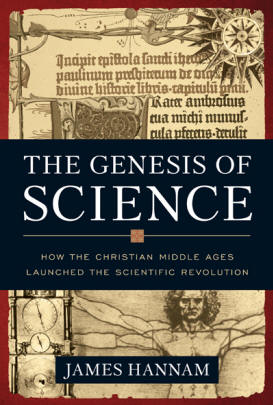The Dark Ages weren't nearly as dark as we have been led to believe. So argues James Hannam in his 2009 book The Genesis of Science: How the Christian Middles Ages Launched the Scientific Revolution.
Historians have told us that human progress pretty much came to a standstill during the Middle Ages. Not until the Renaissance, beginning in the 14th century, did science, technology, the arts, etc., begin to bloom. Hannam contends the Renaissance was actually a step backward in many respects. The Renaissance, he says, was "if anything, even more superstitious and violent" than the Middle Ages. Belief in the occult, especially astrology, became stronger. In terms of science, significant work by scholars of the Middle Ages was ignored, while Renaissance scholars turned back to the teachings of Plato and others from an earlier time for scientific insights.
Fortunately the printing press had been invented late in the so-called Dark Ages, and most of the earlier writings on scientific matters had been published and preserved. Later Galileo and other Renaissance thinkers made full use of these books in their own work, even though they did not usually give sufficient credit to those whose work they built on.
Those earlier men of science have much less familiar names, but Hannam seeks to give attention to many who led the way, including people like Richard of Wallingford, Richard Swineshead, John Buridan, Nicole Oresme and Cecco D'Ascoli. Today the Church and science are often perceived as being at odds with each other, especially over the question of the origin of life, but most of these scholars from the Middle Ages were men of the Church who saw it as their duty to discover everything they could about the universe God made. Had it not been for the Church, the Dark Ages might actually have been dark.
Hannam even argues the Inquisition was not nearly as bad as history has led us believe. The Church did send some people to the stake, but they were relatively few. In most cases the Church sought ways to avoid severe penalties. The Inquisition, the author points out, introduced a new legal system still in use today in which crimes are actually investigated and defendants are given an opportunity to defend themselves.
"Ironically, by keeping philosophers focused on nature instead of metaphysics, the limitations set by the Church may even have benefited science in the long term," Hannam writes. "Furthermore, and contrary to popular belief, the Church never supported the idea that the earth is flat, never banned human dissection, never banned the zero, and certainly never burnt anyone at the stake for scientific ideas."
Hannam writes for the lay reader, not for either scientists or historians. Read his book to see the Dark Ages in a new light.

No comments:
Post a Comment